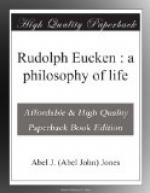Man gains for himself, too, a personality in the true sense of the term. Eucken does not mean by personality “mere self-assertion on the part of an individual in opposition to others.” He means something far deeper than this. “A genuine self,” says Eucken, “is constituted only by the coming to life of the infinite spiritual world in an independent concentration in the individual.” Following a life of endeavour in the highest cause, and continual appropriation of the spiritual life, he arrives at a state of at-one-ness with the universal life. “Man does not merely enter into some kind of relation with the spiritual life, but finds his own being in it.” The human being is elevated to a self-life of a universal kind, and this frees him from the ties and appeals of the world of sense and selfishness. It is a glorious conception of human personality, infinitely higher than the undignified conceptions of naturalism and determinism.
And if man wins a glorious personality, he may gain immortality too. Unfortunately, Eucken has not yet dealt fully with this question, but he is evidently of the opinion that the spiritual personalities are immortal. As concentration points or foci of the spiritual life, he believes that the developed personalities are at present and in prospect possessors of a spiritual realm. But there will be no essential or sudden change at death. That which is immortal is involved in our present experience. Those who have developed into spiritual personalities, who have worked in fellowship with the great Universal Life, and become centre-points of spirituality, have thus risen supreme over time and pass to their inheritance. Those who have not done so, but have lived their lives on the plane of nature, will have nothing that can persist.
Hence it is that the negative movement leads to freedom, personality, and immortality; the neglect to make the movement consigns the individual to slavery, makes a real “self” impossible, and at death he has nought that a spiritual realm can claim. The choice is an all-important one; for, as a recent writer puts it, “In this choice, the personality chooses or rejects itself, takes itself for its life-task, or dies of inanition and inertia.”
CHAPTER VII
THE PERSONAL AND THE UNIVERSAL
In the last chapter the ascent of the human being from serfdom to freedom and personality was traced. In doing so it was necessary to make frequent reference to the Universal Spiritual Life.




